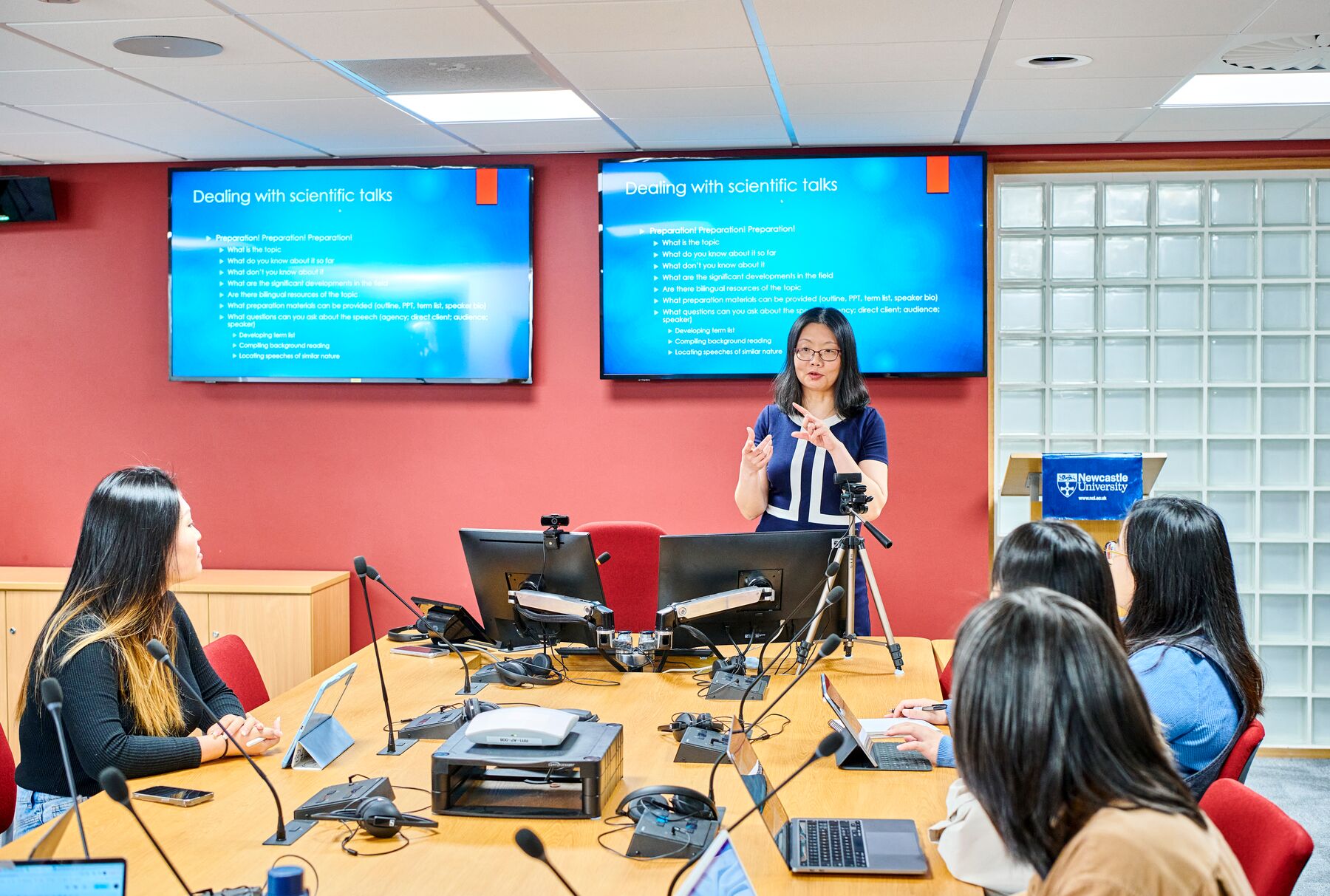Translation and Interpreting Research
Our primary research purpose is to find out more about how translating and interpreting work.
Society, culture and identity
Here, we explore issues such as:
- how translators and interpreters communicate
- how translators and interpreters shape images of other peoples, times and cultures
- the role of translation in the transmission and reception of political ideas
- how issues of identity, gender, sexuality and power affect translating and interpreting
- how ideology and beliefs interact with translating and interpreting
- translating women’s writing
- the role of literary translating in nation-building, conflict and reconstruction
- how translators bridge geographic distances and time gaps between past and present
Chinese and English
Research in Chinese and English explores:
- interpreter cognition, emotion, and prosody
- the sociolinguistic, cognitive and affective dimensions of translation and translators
- audiovisual and video game localisation
- translator/interpreter education
We are particularly interested in fields like technology, cultural identity, paralinguistics, and ideology. Our research often focuses on how these shape performance, meaning-making, and pedagogy. This research covers multilingual, multimodal contexts.
French
We investigate how French and Francophone women's writing is translated into English. The research focuses on the contemporary and transgressive.
Discover our wider French research.
Dutch
Our School hosts an inter-university research project with Dutch and UK poets. The project explores the role of bilingual language advisors. The research explores how these advisors help the poets translate each other’s poems. This project is funded by the Arts and Humanities Research Council.
Bosnian, Croatian, Serbian
We also carry out cutting-edge research on translation from Bosnian, Croatian and Serbian. The research focuses on translating the main languages of former Yugoslavia into English.
A key aim is to establish the role of translating during key stages of nation-building. Conflict and reconstruction are both key themes. The project primarily focuses on literary translation.
Key research interests
Some of the key interests of our community of staff and student researchers are:
- professional translation and interpreting
- translator and interpreter training and assessment
- literary translation
- audio-visual translation
- translation, language, and culture
- translation, society, and identity
- interpreting, multilingualism, social justice, conflict, and reconciliation
- interpreting, translation, globalisation, and politics
- the psycholinguistics of cognition and emotion in interpreting
- localisation and translation of video games and other digital interactive media
Dr Ya-Yun Chen (Yalta)
Dr Ya-Yun Chen (Yalta) is a scholar of translation, audiovisual translation, and interpreting studies. Her research examines the roles of emotion, creativity and reflective learning in translation and interpreting, as well as the impact of machine translation (MT) and artificial intelligence (AI) on translation quality and professional practice.
With over 35 years of professional experience as a freelance language specialist, she brings substantial industry insight to her research, focusing on the contexts and practices involved in translating environmental literature, audiovisual media, and video games.
Dr Chen’s current projects focus on the emotional and creative dimensions of video game translation, the influence of MT and AI on localisation and quality assurance, and interpreters’ collective memory and emotional labour.
Dr Jade Biyu Du
Dr Jade Biyu Du is an interdisciplinary scholar with expertise in translation and interpreting studies, applied linguistics and law. Having studied and worked across mainland China, Australia, and Hong Kong, Dr Du brings a global perspective to her research.
Her decade-long professional experience has informed her exploration of the social, ethical, and technological dimensions of translation and interpreting. Her work examines how language mediation impacts access to justice, healthcare and inclusion in multilingual and multicultural societies.
She collaborates with legal, medical, and mental health professionals to improve communication in institutional contexts and advocates for an interprofessional education (IPE) training model that enhances mutual understanding between language professionals and service providers.
Her recent projects investigate how technology-driven interpreting influences communication, professional practices, and broader issues of social justice in medical and legal settings.
Dr JC Penet
Through interdisciplinary and collaborative projects, Dr Penet researches how Artificial Intelligence and automation are reshaping the translation industry, with a particular focus on their impact on freelance translators' perception of their work and on their wellbeing.
This research directly informs his exploration of how translator education and professional development must adapt to better prepare practitioners for the challenges and demands of a rapidly evolving industry.
By supporting more sustainable, psychologically informed approaches to translator training and industry practices, his work contributes to the United Nations' Sustainable Development Goals (SDGs) related to decent work and mental wellbeing (SDGs 3 and 8).
Dr Dariush Robertson
Dr Dariush Robertson is an industry-informed scholar specialising in video game localisation, the localisation industry, and Chinese-to-English translation.
Through innovative research and sustained collaboration with industry partners, he developed game sense theory—the first theoretical framework to foreground cultural specificity in video game translation.
With seventeen years of experience in the localisation and translation industry, Dr Robertson has cultivated an extensive professional network spanning translation, localisation, and the wider video game sector. His professional background includes managing a successful Chinese-to-English localisation business for over a decade.
His current research focuses on the cultural and transmedial impact of recent Chinese video games localised for Anglophone markets. This line of inquiry also explores the extent to which such games can be understood as genuinely localised, rather than merely adapted for international audiences.

.jpg)
.jpg)